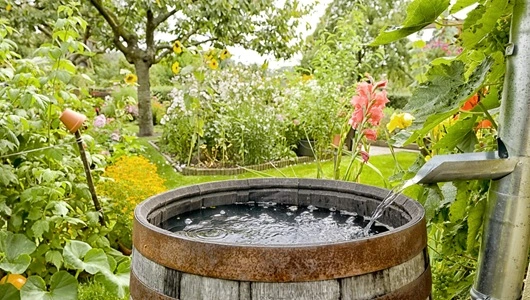To put it simply, well, it is generally not illegal to catch rainwater in most states of the country. But still, since there are specific laws regarding this in different states, we’d surely say to check back on those before you install a rainwater-collection system. That’s all! If you care to know more about it then just keep on reading.
How Does It Work?

It’s kinda simple actually, like, the majority of people collect rain by channeling it down from their roofs into barrels or tanks. Depending on the quantity of water you want to preserve and what you intend to do with it, you can opt for the simple rain barrel or a system with filters and storage containers.
Who Regulates Rainwater Harvesting, Like, Federal or State?
To be straight up here, you see, there is no federal law prohibiting the collection of rainwater. So, in other words, the United States government is okay with it. However, these rules may vary from state to state, so check back on your state first.
Each state establishes its own set of regulations; some have no objections, some have restrictions, and one or two are more rigid.
States That Encourage Rainwater Collection
And then there are the hardcore rainwater-collectors from various states who offer tax incentives or rebates to support this. These include:
- Texas: There is no sales tax on any equipment used for rainwater harvesting, and it is even promoted in building design.
- Arizona: Tax credits are given to homeowners who install the systems.
- California: No permit is required for collecting rain off your roof as long as it is not used for drinking.
- Oregon and Virginia: These states also have relaxed criteria toward rainwater collection.
States That Allow It, But With Limits
Certain states permit the collection of rainwater but have set regulations that must be upheld. Like:
- Colorado: Their suggestion is to collect rainwater in two barrels, each with a maximum capacity of 110 gallons. It is meant to be used outdoors only.
- Utah: Requires registration for systems storing more than 100 gallons, with rules on usage.
- Nevada: Allows rainwater collection by single-family residences for non-potable uses.
- Arkansas, Georgia, Illinois: Allows it with safety precautions, mostly if the water is for drinking.
States With No Restrictions
And sure enough, there are some states that don’t have any specific laws regarding this, so you can go all-in for this and do whatever you want with this system and how you use that water. These states include:
- Missouri
- New York
- Montana
- And several others
In these states, one can freely harvest and use water as long as it is not sold or cause any public nuisance. It is supposed to be a private right just like growing vegetables in a backyard.
Why Do Some States Regulate Rainwater Collection?
Normally, the concern is in respect to illegalities in collection, but in reality, it is about the fair management of water sources. Rainwater in dry areas acts as an inflow to rivers, lakes, and groundwater. If excessive amounts are collected, it could lead to a reduction in water availability downstream.
Also, in some states where water rights are very strict, water is either in fact or in law allocated to others (such as farms or cities), and harvesting rainwater before it touches the ground would stand in conflict with those rights.
Health is another factor. Not a lot of people know this, but yes, the rainwater is considered impure since it can get mixed with dust, debris, or bird droppings from your roof. So, states that do regulate it want to make sure the water is safe to drink.